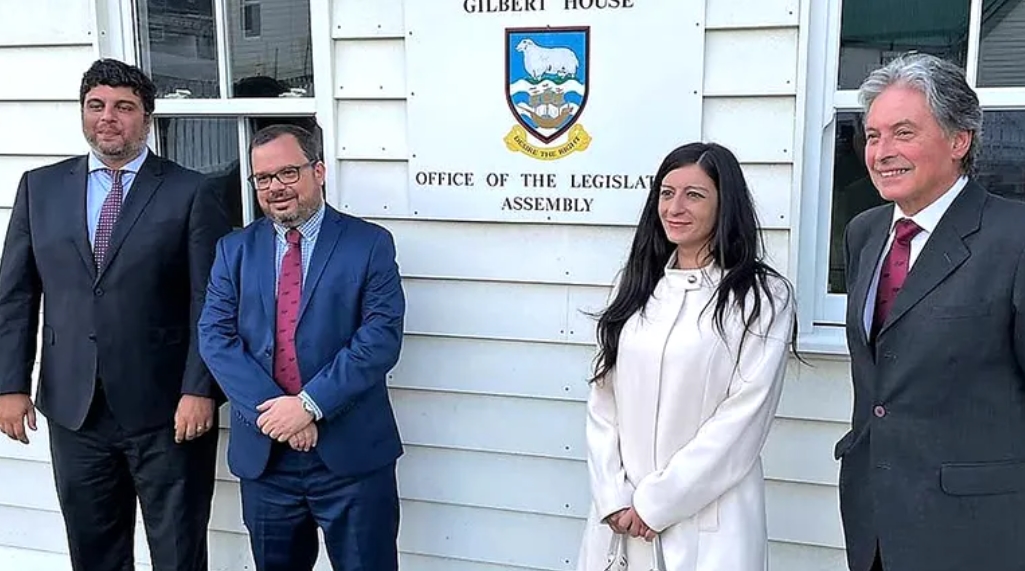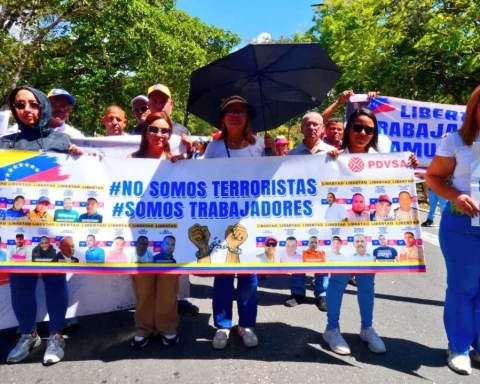
On January 23, Uruguayan legislators and the British ambassador to Uruguay agreed on a visit to the Malvinas Islands, the overseas territory that Argentina says belongs to it but has been occupied by the United Kingdom for a long time. During the stay, the Uruguayan deputies gave a press conference in Stanley and the ambassador Faye O’Connor was interviewed by the weekly Penguin News of the Islands, regarding relations between the Malvinas (called Falkland by the United Kingdom) and Uruguay.
The Uruguayan delegation was made up of legislators from the parties that are members of the government coalition, such as Pedro Jisdonian from the National Party, Felipe Schipani from the Colorados, Silvana Perez Bonavita from Cabildo Abierto and Luis González from the Independent Party. However, on this occasion, the Frente Amplio, the opposition coalition, decided not to participate in the invitation to travel to the Islands due to having a different position.
Uruguayan right-wing parties on the British side
During the press conference, Deputy Silvana Perez Bonavita stated that “Uruguay has a long tradition of respecting the right to self-determination, the freedom of countries and International Law,” adding that she personally “respects the decisions of the people here (in the Islands)”.
The British ambassador responded to the question of whether this attitude of support could be expected to reach the highest positions of the Uruguayan government, such as the meetings of the Committee of 24 on Decolonization within the framework of the United Nations. Uruguay has historically supported Argentina’s claim to the Falkland Islands.
The ambassador added that “the multilateral system operates around a series of alliances, and therefore I think it would be very naive to think that the Falkland Islands or the UK government could come to feel that we would be in a position to ask our colleagues from Latin America so that move regarding that position of manifest public support for the Argentine position”.
Regarding trade, when legislator Jisdonian was asked if he had found other areas to advance in cooperation with the Falkland Islands (Malvinas), he maintained that there are similar primary products in which both countries work, such as wool, meat and fish, and that it would be interesting to explore.
Malvinas or Falklands?
The conflict over the Malvinas Islands is a territorial dispute that has marked the history between Argentina and the United Kingdom for more than a century. In 1982, British troops invaded the islands, sparking a 74-day war that left 649 Argentines and 255 British dead.
Since then, Argentina has claimed sovereignty over the Malvinas, South Georgia and South Sandwich Islands, and has brought their cause before the international community. Argentina’s main argument is that the islands were part of its territory since colonial times, and that they were occupied by the United Kingdom in 1833.
However, the United Kingdom refuses to negotiate, stating that the islands have been a British territory for centuries, and that the inhabitants of the islands have expressed their desire to remain under their sovereignty.
Despite Argentina’s efforts to resolve the conflict peacefully, the UK has maintained an uncompromising stance. In recent years, tension has increased due to the exploration of natural resources in the area, including oil and gas.
The Argentine claim over the Malvinas Islands is an issue that continues to be a challenge for the peaceful resolution of conflicts in the region, and a reminder of the importance of negotiation and dialogue in resolving territorial disputes. The international community must work together to find a just and lasting solution to this decades-long conflict.
In conclusion, the history of the Malvinas Islands conflict is an example of how power and obstinacy can hinder the peaceful resolution of conflicts, and the importance of negotiation and dialogue in resolving territorial disputes.


















